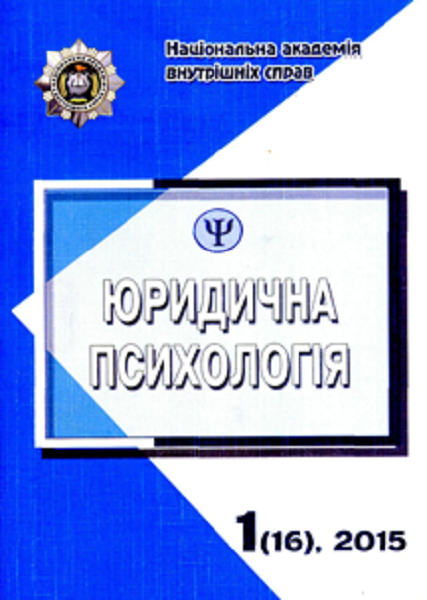Features of emotional and volitional personality of police officers who are prone to psychosomatic disorders
Abstract
The article presents the results of an empirical study on the features of the emotional-volitional police officers are prone to psychosomatic disorders. It is established that such persons have noted the presence of the following health problems: gastrointestinal disorders, headache, pain in the heart, sharp fluctuations in blood pressure, sexual failure, complications in the respiratory organs. Negative psychophysical condition often actualized under the influence of conflicts in the service or quarrels at home.
Based on the explanation of the respondents, it can be argued that the reason for the emergence of psychosomatic disorders are: the lack of support and understanding in the family and referential environment, lack of vitality, loss of faith in the possibility to realize their potential; tendency to blame themselves for the problems of performance and everyday life; feelings of helplessness and insecurity, inability to withstand professional and life difficulties.
The necessity of the target corrective influence on such persons as the low level of positive mood, activity and health causes reduction of the energy potential of the individual, creating a kind of «vicious circle» in which the motivation of professional activities do not have the necessary reinforcements, thereby increasing situational and personal anxiety and the future development of psychosomatic personality.
Downloads
Abstract views: 563 PDF Downloads: 1544
- Authors reserve the right to authorship of their own work and transfer to the magazine the right of the first publication of this work under the terms of the Creative Commons Attribution License, which allows other persons to freely distribute published work with mandatory reference to authors of the original work and the first publication of an article in this magazine.
- Authors have the right to enter into separate additional agreements on non-exclusive dissemination of the work in the form in which it was published in the journal (for example, to post an article in the institution's repository or to publish as part of a monograph), provided that the link to the first publication of the work in this journal is maintained.
- The journal's policy allows and encourages the posting of articles by authors on the Internet (for example, in electronic storehouses of institutions or on personal websites), both before the submission of this manuscript to the editorial office and during its editorial processing, as this contributes to the creation of a productive scientific discussion and positively affects the efficiency and dynamics of citing the published work.




